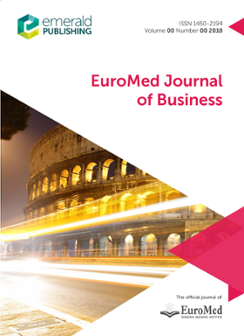The influence of knowledge creation process on customer relations management: evidence from Palestinian commercial banks
IF 3.9
Q2 BUSINESS
引用次数: 0
Abstract
PurposeThe purpose of this study is to examine the influence of knowledge creation (KC) process on customer relations management (CRM) in Palestinian commercial banks, taking into consideration which factors of KC process support the CRM system.Design/methodology/approachThe study uses a quantitative research design wherein questionnaires have been used to collect data from 345 respondents in the Palestinian banking sector. Research hypotheses have been tested using multiple regression analysis.FindingsThe findings unveil that socialisation and combination processes have a positive impact on CRM. In contrast, internalisation process negatively affects CRM system, but outsourcing knowledge does not significantly affect CRM.Research limitations/implicationsPast studies empirically validated the success of CRM adaptation in the context of different industries. This study provides a new conceptual model which validates the influence of KC on CRM in the banking sector. It also affirms the integral role of KC in supporting CRM from an emerging country perspective like Palestine.Practical implicationsThis study offers new insights into creating of knowledge by employees in supporting CRM. It will encourage future scholars to further explore the key dimensions of the KC process for a more detailed investigation at a workplace. This study suggests that banks’ directors and employees should behave in a social manner to support relationship with customers. This study also suggests facilitating knowledge from different resources in innovative ways, through encouraging creative thinking from experiences, using technology in sharing knowledge, focussing on appropriate training to resolve customers' problems and disseminating new knowledge among employees.Originality/valueThis study expands the body of knowledge on KC process in supporting CRM from an emerging country perspective. This study validates the influence of KC on CRM in the Palestinian banking sector. This sheds light on the integration of these two concepts.知识创造过程对客户关系管理的影响:来自巴勒斯坦商业银行的证据
本研究的目的是考察知识创造(KC)过程对巴勒斯坦商业银行客户关系管理(CRM)的影响,并考虑知识创造过程中哪些因素支持客户关系管理系统。设计/方法/方法本研究采用定量研究设计,其中使用问卷收集巴勒斯坦银行业345名受访者的数据。采用多元回归分析对研究假设进行了检验。研究结果揭示了社会化和组合过程对客户关系管理有积极的影响。内部化过程对CRM系统有负向影响,而外包知识对CRM系统无显著影响。过去的研究从经验上验证了CRM适应在不同行业背景下的成功。本研究提供了一个新的概念模型来验证KC对银行客户关系管理的影响。它还从巴勒斯坦等新兴国家的角度肯定了KC在支持CRM方面的不可或缺的作用。实践意义本研究为支持CRM的员工创造知识提供了新的见解。这将鼓励未来的学者进一步探索KC过程的关键维度,以便在工作场所进行更详细的调查。本研究建议银行董事和员工应以社交方式支持与客户的关系。本研究亦建议以创新的方式从不同的资源中获取知识,包括鼓励从经验中创造思维、利用科技分享知识、重视适当的培训以解决客户的问题,以及向员工传播新知识。原创性/价值本研究从新兴国家的角度扩展了KC过程支持CRM的知识体系。本研究验证了KC对巴勒斯坦银行业客户关系管理的影响。这阐明了这两个概念的融合。
本文章由计算机程序翻译,如有差异,请以英文原文为准。
求助全文
约1分钟内获得全文
求助全文
来源期刊

EuroMed Journal of Business
BUSINESS-
CiteScore
9.80
自引率
19.20%
发文量
61
期刊介绍:
The EuroMed Journal of Business (EMJB) is the premier publication facilitating dialogue among researchers from Europe and the Mediterranean. It plays a vital role in generating and disseminating knowledge about various business environments and trends in this region. By offering an up-to-date overview of emerging business practices in specific countries, EMJB serves as a valuable resource for its readers.
As the official journal of the EuroMed Academy of Business, EMJB is committed to reflecting the economic growth seen in the European-Mediterranean region. It aims to be a focused and targeted business journal, highlighting environmental opportunities, threats, and marketplace developments in the area. Through its efforts, EMJB promotes collaboration and open dialogue among diverse research cultures and practices.
EMJB serves as a platform for debating and disseminating research findings, new research areas and techniques, conceptual developments, and practical applications across various business segments. It seeks to provide a forum for discussing new ideas in business, including theory, practice, and the issues that arise within the field.
 求助内容:
求助内容: 应助结果提醒方式:
应助结果提醒方式:


